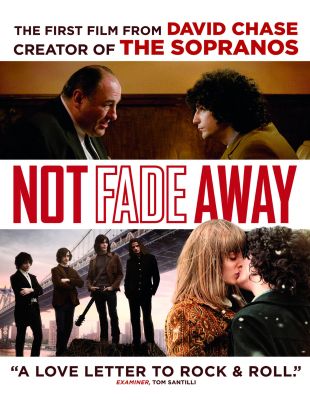
Rock & roll is salvation, rebellion, fun, sex, and the greatest middle finger ever extended by one generation at another. If you actually believe all of that, even a little bit, David Chase's far-from-perfect Not Fade Away is hard to dislike.
The movie stars John Magaro as Douglas, a music-obsessed New Jersey high-school senior who quickly abandons his thoughts of joining the military when he hears the British Invasion, especially the raw blues swagger of the young Rolling Stones. He begins drumming in local bands with his buddies and, over the course of summer and winter breaks home from college, fights with his gruff dad (James Gandolfini), tries to win the heart of a girl he's been crushing on since forever, and keeps his dreams of being a rock star alive.
.jpg)
Director and screenwriter David Chase is of course best known for his respected television résumé, which includes working on Northern Exposure and The Rockford Files, and masterminding The Sopranos, and Not Fade Away is certainly episodic in structure. Months or even whole years pass in the blink of an eye, and Chase gives just the tiniest of hints -- a character's new hairstyle or a particular music cue -- to help us keep our bearings. However, after about an hour, you realize that there really isn't a traditional narrative here with a beginning, middle, and end. We just drop in on Douglas' life as he fights with his old man, has a taste of music-business success, and almost sees Charlie Watts at a Hollywood party in 1969.
Although it's easy to accuse Not Fade Away of being just another baby-boomer nostalgia trip, Chase avoids many of the elements you might expect from a film like that. There's little talk of Vietnam, no mention of Woodstock, and the hippie movement as a whole is ignored. The movie is so confidently meandering, so relaxed and down-to-earth, that those who don't have an emotional attachment to the time period or the music that sprang from it are likely to grow bored.
.jpg)
Regarding the original music in the picture, while the actors all sing their vocal parts -- Douglas ends up fronting a band -- the songs are actually played by executive producer Steve Van Zandt's friends, fellow members of Bruce Springsteen's E Street Band, and there is a kick in listening to these seasoned professionals make themselves sound like a bunch of young kids hammering out their first songs. As for the familiar and not-so-familiar tunes that comprise the majority of the film's soundtrack, Van Zandt's taste is flawless.
Although the music cues are undeniably personal for Chase, you don't have to have an inordinate fondness for the '60s to understand the heart of the movie. He's not really nostalgic for that time period; he's nostalgic for those heady years of life -- say, between the ages of 18 and 24 -- when you clumsily search for your identity, latching on to what the culture gives off in order to help.
